Laser Dentistry vs. Traditional Dentistry

Laser dentistry is an alternative to conventional dental treatments. These modern methods offer patients less invasive and more precise procedures. Laser dentistry prioritizes patient comfort while reducing healing time compared to traditional dental methods.
Laser dentistry: how it works
Laser dentistry uses focused light energy to treat a variety of dental conditions. There are two primary types of dental lasers: hard tissue lasers and soft tissue lasers. The dentist uses hard tissue lasers for procedures involving teeth, while soft tissue lasers are used for gum-related treatments.
The dentist can use this technology to do the following:
- Remove or reshape soft tissue
- Sterilize treatment areas
- Stimulate tissue regeneration
- Prepare cavities for fillings
- Treat periodontal disease
- Remove stains and whiten teeth
This technology minimizes bleeding and swelling, making procedures more comfortable and less painful.
Understanding traditional dentistry methods
Traditional dentistry relies on mechanical tools, including drills, scalpels, and dental picks. While effective, these instruments can cause discomfort, particularly when used on sensitive areas. Additionally, procedures such as cavity removal, gum surgery, and root canal therapy often require the use of anesthesia and involve longer recovery times.
Traditional methods remain the standard for many practices because of their reliability and reputation. However, this approach can sometimes result in greater damage to surrounding tissues, leading to longer healing periods and increased discomfort.
The benefits of laser dentistry
One of the most significant advantages of laser dentistry is that it is minimally invasive. Patients experience less bleeding, reduced pain, and minimal swelling after undergoing laser dentistry procedures. Lasers sterilize as they operate, which lowers the risk of infection. Additionally, many laser treatments do not require stitches or heavy sedation.
Laser dentistry also enables dentists to perform more precise dental techniques. The focused light will only target the affected area without harming neighboring tissues. This feature is particularly beneficial for periodontal therapy and cosmetic gum reshaping. As a result, patients can resume normal activities sooner than with traditional methods.
When patients may prefer traditional methods
While there are several benefits of laser dentistry, there are cases where the dentist may need to use traditional dental techniques and tools. Certain procedures, such as preparing crowns or filling deep cavities, typically require the use of mechanical instruments. Additionally, not all dental practices have integrated laser technology due to the upfront cost and additional training requirements.
In some cases, traditional dentistry offers faster treatment, particularly when the dentist needs to address multiple issues during a single visit. Insurance coverage can also vary, as some providers may not fully reimburse the cost of laser procedures. However, this coverage varies from policy to policy.
How to choose between laser and traditional dentistry
The choice between laser dentistry and traditional dentistry depends on several factors. Some of these factors include:
- The specific dental issue
- The patient's dental and medical history
- The dentist's expertise and training
- The patient's preference
A thorough consultation before treatment can help both the patient and the dentist determine the most effective and comfortable option for their specific needs.
Learn more about how we use laser dentistry
Laser dentistry offers precise, comfortable, and quicker healing options, making it a superior choice compared to traditional methods. While it is not appropriate for every dental procedure, the increasing use of it in modern dental practices demonstrates a move toward less invasive and more effective treatments. Learn more about how Riverside Dental uses laser dentistry in our Fort Worth practice.
Request an appointment here: https://www.riversidefortworthdental.com or call Riverside Dental at (817) 210-4082 for an appointment in our Fort Worth office.
Check out what others are saying about our dental services on Yelp: Laser Dentistry in Fort Worth, TX.
Recent Posts
A cosmetic dentist considers several factors when designing a patient's smile makeover plan. The goal of the plan is to improve the overall appearance of the smile. By considering relevant factors such as the patient's goals and health, the dentist can craft a customized cosmetic procedure plan to give the patient the desired results.The process…
Dental implants feel and function just like natural teeth, and they can last a lifetime. An implant is a rod or screw that is placed in the jawbone. It is usually made out of titanium, but it can also be made out of zirconium.Dental implants replace missing teeth roots, and restorations like crowns are placed…
Implant supported dentures are often ideal for a person with missing teeth who has enough bone to support implants. Dental implants have become immensely popular because of the host of benefits they offer. Implants can support a denture, bridge, or crown. Keep reading to learn more about the advantages of implant supported dentures.Implants are artificial…
It is essential to visit a family dentist every six months to maintain proper oral health. While it is possible to keep the teeth and gums suitably clean with appropriate brushing and flossing techniques, excellent home care is never a substitute for professional cleanings and preventative care. However, there are more benefits to routine dental…


